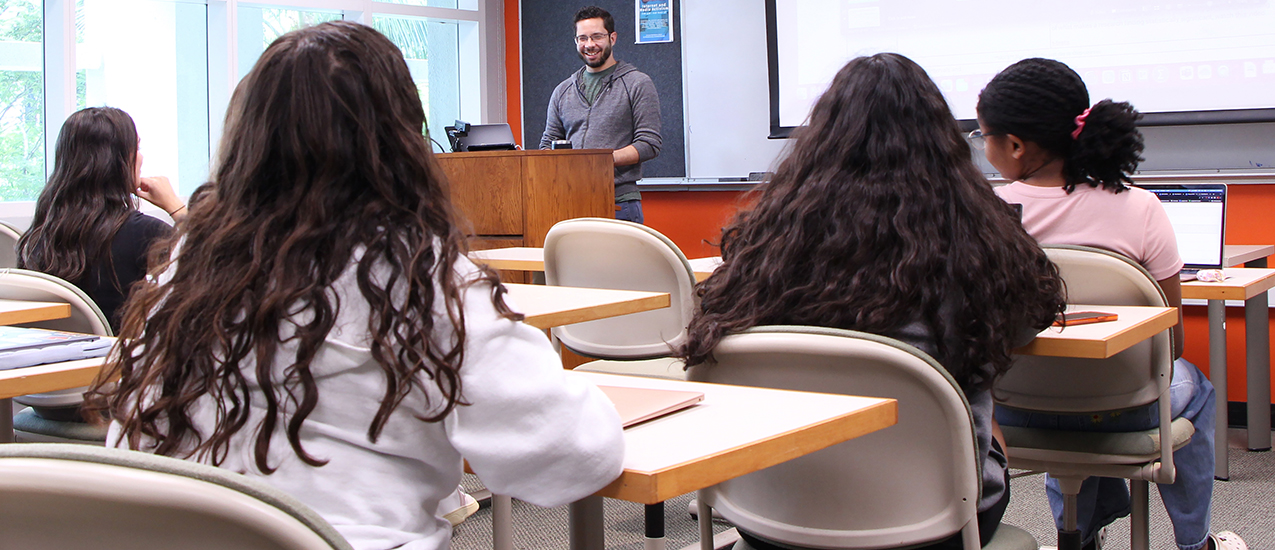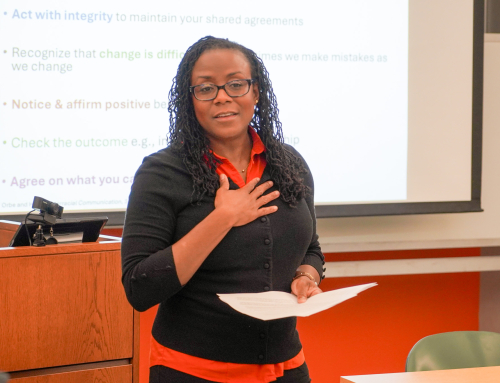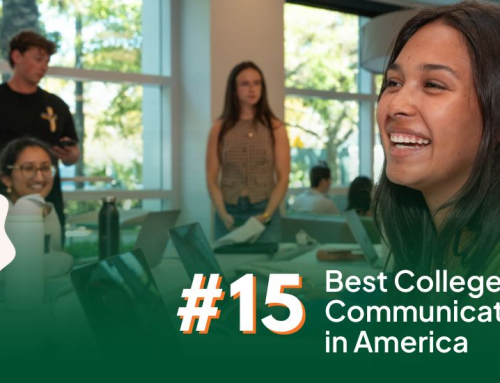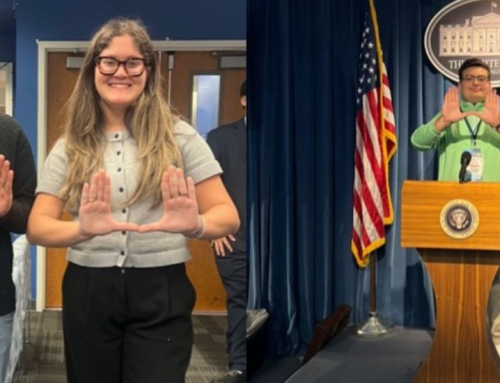By Karina Valdes
Nicholas Carcioppolo, Ph.D., associate professor for the Department of Communication Studies at the University of Miami School of Communication, recently sat for a Q&A where he shared a bit about himself, the Communication Studies program, and his perspective on health communication.
Q: What is Communication Studies?
A: Despite the fact that it’s something we do daily, there is a lack of appreciation for the complexity and nuance of communication. One of my favorite definitions of communication uses the metaphor of flat-pack furniture. Much like flat-pack furniture, messages rarely come complete with everything necessary to assemble what was intended. One needs to attend to obvious considerations like inferring syntactic and semantic meaning, but also make inferences about latent meaning based on your knowledge of the speaker, the situation, past experiences, etcetera, all while they frame their messages based on inferences about you. This only scratches the surface of the complexity of communication.
To some extent, we all believe we’re expert communicators as we do it every day. Nevertheless, the social, psychological, financial, and even physical consequences of poor communication surround us.
Communication Studies as a discipline focuses on understanding the complexities of our communication environment which is crucial to the construction and interpretation of our social world.
Q: Can you describe your background and experience in the field of health communication and what drew you to this area of study?
A: I was initially doing research on nonverbal cues to deception as an M.A. student. I worked in Dr. Mark Frank’s lab at the University at Buffalo where we did experimental research trying to predict when people were lying based on the micro-expressions, or small facial muscle movements, they make during conversation. While this work was super interesting and made me a better poker player, I started to be more interested in some of the health communication research that was happening around the department. When I started my Ph.D., I took a cancer communication class with Dr. Jakob Jensen which solidified my interest in health communication. The course had an extensive reading list detailing the many contributions of health communication research in cancer prevention, diagnosis, and survivorship. This class helped to solidify my interest in health communication generally and cancer communication specifically.
Q: What can students expect to learn or do when studying health communication at the School of Communication?
A: We have a health communication minor at the undergraduate level that prepares students to work in health organizations such as hospitals, public health agencies, and nonprofit organizations. This minor is administered in the School of Communication and the School of Nursing.
At the graduate level, there’s a more pronounced focus on health communication theory and methodology, learning to evaluate theory and applied health communication interventions using empirical research methods.
Q: Could you share some examples of research projects or initiatives that you’ve been involved in that have had a significant impact on improving health communication strategies?
A: I’m doing some research now that I’m really excited about that has the potential to impact the way that we frame health interventions to impact colorectal cancer screening rates, as well as other health behaviors. Many interventions to increase colorectal cancer screening behaviors utilize humor appeals. Problematically, we have little evidence about their effectiveness and a substantial amount of evidence about the ways these interventions can fail to achieve their persuasive goals. My current research involves understanding how and why humorous intervention messages can increase persuasive outcomes, which can help inform when humor appeals may be most effective and among what audience segments.
Q: In your opinion, what are the key challenges and opportunities in health communication today, particularly in light of recent global health events?
A: Misinformation is probably the clearest example of a challenge. It also represents an opportunity for communication researchers. We are in a unique point in history in this country where increasingly divided political opinions lead to different sets of perceived facts that impact health decision-making. Health communication researchers will be an important part of identifying underlying motivations for the nonperformance of health behaviors and for constructing persuasive interventions for all audience segments.
Q: How do you teach students to critically assess and combat misinformation in health communication?
A: In persuasion and health communication classes we focus on developing health intervention messages that can combat health misinformation. We use health communication theory paying particular attention to different audience segments and their barriers and motivators of health behavior. We also pay attention to message features of our interventions that can result in unintended effects. This is important, as much of our health beliefs now are highly tied to our value systems and political affiliation, so avoiding messages that can shame and stigmatize people for their health beliefs will be an important first step in eliciting change. As an example of an unintended effect in health interventions, the Florida hotline for problematic gambling is 1-800-ADMIT IT, which may unintentionally shame and stigmatize those who are at risk of problematic gambling and make them less likely to seek help.
Q: What emerging trends or areas of research do you believe will shape the future of health communication and how do you prepare your students for these developments?
A: I think health communication research has focused too much on a single message in a single context, making it difficult to show that your study will generalize across multiple topic areas. There is a strong push now to test multiple message variations across multiple contexts, leading to stronger conclusions.
Q: In your experience, what are the most important skills and qualities that students should cultivate to excel in the field of health communication?
A: I think an important part of many jobs in health communication is data literacy. Decisions about how to design interventions or which populations are priorities to target are based on one’s ability to make sense of data from multiple sources. I would also say that strong writing and presentational skills are important to cultivate. To develop these skills, I’d recommend taking research methods courses, persuasion courses, and presentational speaking courses. Internships are always very helpful, potentially at nonprofits or in hospital systems.
Q: What classes do you teach and what makes those classes stand out from offerings in other communication studies programs?
A: At the undergrad level, I often teach our communication theory course and research methods course. I don’t think they stand out from other courses, but are foundational to our understanding of the world around us.
Q: Can you discuss any innovative teaching methods or approaches you’ve used in the classroom?
A: One assignment I like to use in my persuasion course is a paper and presentation based on students’ interaction with a salesperson in a high-pressure environment, usually where the salesperson works on commission such as a car dealership or jewelry store. I have students go in teams where one person interacts with the salesperson and the other covertly takes notes on their phone about what the salesperson says. Later, the team breaks down the salesperson’s appeal using persuasion theory. I think this is helpful as these high-pressure situations are uncomfortable, anxiety-inducing, and tense. This exercise allows you to see through influence attempts to understand why they make you feel that way, and, in doing so, reduce some of the pressure to make better decisions.
Nicholas Carcioppolo is an award-winning health communication researcher who has been published in journals including “Social Science & Medicine,” “Health Education & Behavior,” “Health Communication,” “Journal of Health Communication,” “JAMA Dermatology,” and “Patient Education & Counseling.”
Growing up in Ronkonkoma, NY., a suburb of New York City, Carcioppolo earned his Bachelor of Arts at the University at Buffalo where he majored in communication and minored in music performance. He returned to the University at Buffalo for his Master of Arts in Communication where he studied nonverbal cues to deception and, later, health communication. Earning his Ph.D. in health communication from Purdue University, his studies concentrated on health communication message design, persuasion, and health interventions, particularly in the context of designing and evaluating messages to increase the performance of cancer prevention and screening behavior. In 2015, he was awarded the National Communication Association Golden Anniversary Monograph Award which is presented to the most outstanding scholarly monograph published during the previous calendar year.
Built upon a foundation of applied research and theory, the Communication Studies program at the University of Miami School of Communication offers students the opportunity to develop their understanding of human communication in interpersonal, intercultural, and corporate contexts. Visit https://com.miami.edu/communication-studies/ to learn more.







